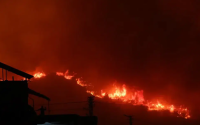 |
Cyclone Gonu struck the capital Muscat, snapping tree branches, damaging buildings, and leaving roads flooded.
Meanwhile, residents along the coast of southern Iran are preparing for the storm, moving to higher ground and sheltering in schools and mosques.
The Iranian town of Jask has reported high winds, heavy rain and overflowing rivers. The main road north is reported to be impassable because of flooding.
In Muscat, roads were flooded and visibility was almost zero at times. Residents experienced cuts in mains electricity and water supply.
BBC user Siva Reddy said the downpour started early in the morning after a period of intense heat.
"Strong winds started battering the trees and the TV dish antennas fixed on top of the buildings started flying around like missiles," she said.
Economic damage
Police had warned people in Muscat to stay indoors and the streets were largely deserted. Some 20,000 people have been evacuated in the oil-rich sultanate.
 |
The authorities at Sohar port closed all operations and evacuated the 11,000 workers.
"These people know the force of the sea and they're doing the right thing," said port spokesman Dirk Jan De Vink. "Most of them are leaving or have already left."
If shipping is halted in the strait, analysts said there could be panic in world oil markets and a steep rise in prices, at least for a short period.
Losing strength
In the last 24 hours Cyclone Gonu has diminished in force, two days after peaking at a maximum Category Five designation over the Arabian Sea.
The cyclone initially generated winds of 160mph (260km/h), but latest reports say they have now dropped to 50-70mph.
In south-west Pakistan, fishing boats were told to stay ashore until the storm passed.
A cyclone is the meteorological name for hurricanes in the Indian Ocean and western Pacific.






